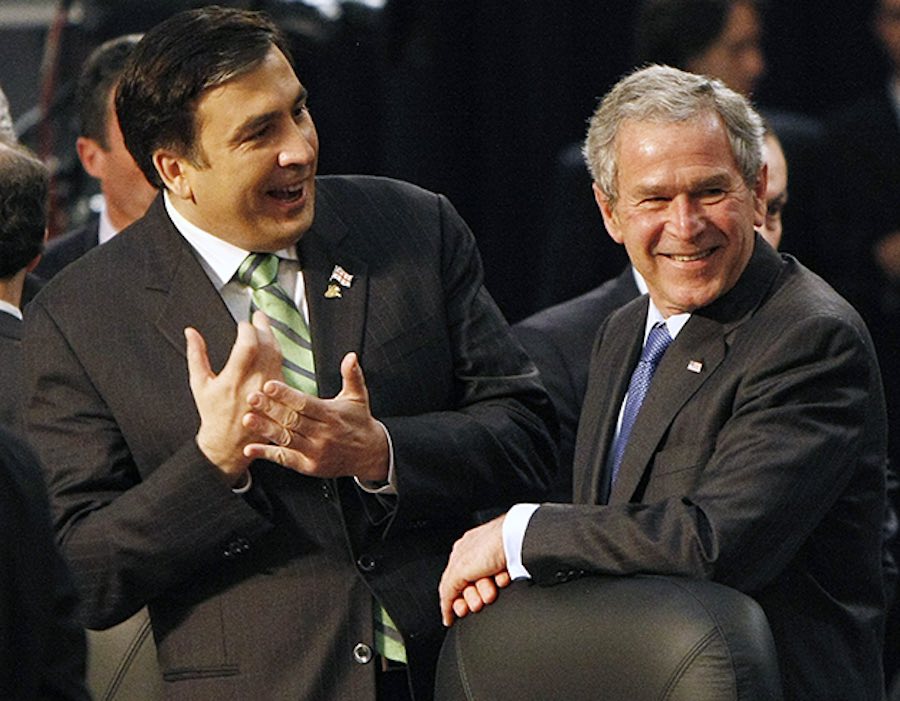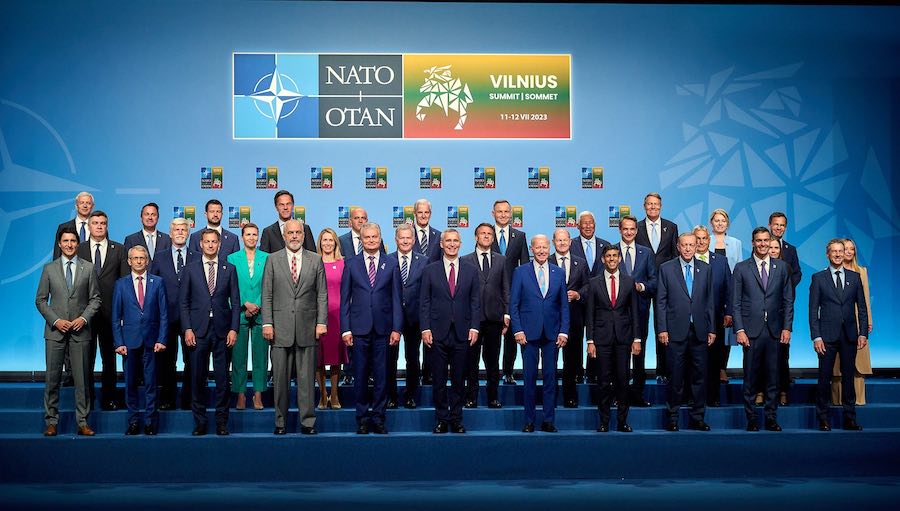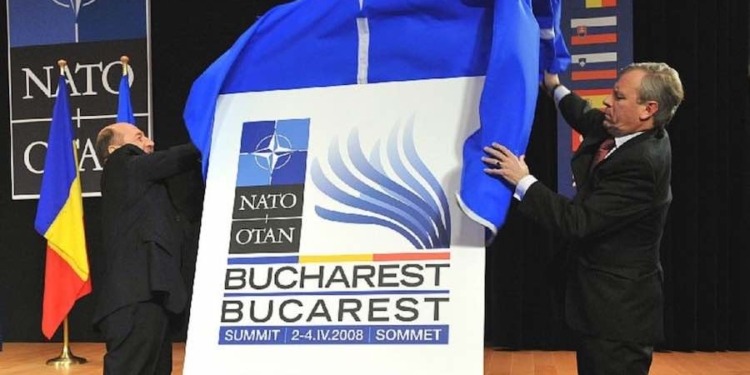The FINANCIAL — NATO’s latest declaration signed by partners on July 10, 2024, in Washington, indicates that NATO is ready to compromise with Russia by removing its interests from Georgia, which was the closest ally in the former USSR since 2003. Russia’s demand that NATO rescind a 2008 commitment to Ukraine and Georgia on membership is partly satisfied.
Days before the U.S. Called Off Military Exercise In Georgia Amid Review Of Relations With Tbilisi, while the EU announced that it suspended €30 million in defense aid to Georgia.
The Pentagon said it will “indefinitely postpone” its planned Noble Partner military exercise with Georgia as the United States reviews its relationship with the South Caucasus nation. The review came following Georgia’s June 3 passage of a “foreign agent” law that was assailed in the West over concerns it will stifle media and independent voices. A Pentagon statement said the decision to postpone the exercise, scheduled for July 25 to August 6, is due to “false accusations” against the United States and other Western entities after U.S. criticism of the law and its sanctioning of some Georgian officials.
But was the “foreign agent” law the only reason for abandoning a long-time partner?
Practical bilateral cooperation between NATO and Georgia started when Georgia joined the Partnership for Peace (1994) and deepened after the “Rose Revolution” in 2003, when a new government pushed for more ambitious reforms.
Allies agreed at the NATO Summit in Bucharest in April 2008 that Georgia will become a NATO member, provided it meets all necessary requirements. This decision has since been reconfirmed at successive NATO summits
Georgia was the largest non-NATO troop contributor to the International Security Assistance Force in Afghanistan, which completed its mission in 2014.
Since 2010, 32 Georgian servicemen have died, all in the Helmand campaign, and 435 wounded, including 35 amputees, as of July 2014. As of May 2016, Georgia was the third largest contributor, after the United States and Germany, to the Afghanistan mission.
On 5 January 2008 Georgia held a non-binding referendum on NATO membership with 77% voting in favor of joining the organization.
During NATO’s 2008 Bucharest summit in Bucharest, the United States and Poland called for Georgia to be allowed to join the Membership Action Plan (MAP). The alliance decided not to offer Georgia a MAP due to opposition from several countries, led by France and Germany, who feared the decision would anger Russia.
The former German leader, called by POLITICO “Putin’s useful German idiot” , was known for speaking Russian and keeping diplomatic ties with Putin. It was also during her term that Germany stepped up its energy links to Moscow and kept its national defense spending to a minimum.
Blocking Georgia’s NATO membership did not save Georgia from Russian invasion.
During the Cold War, the term “useful idiot” became a label for moderates in the West who fell victim to the communists’ credulous arguments.
Soon after the NATO summit, Russia attacked Georgia and occupied South Ossetia (Samachablo) and Abkhazia. Later Russia recognized these territories as independent states.
As a result of the August 2008 war between Russia and Georgia, Georgia lost 170 employees of the Georgian Ministry of Defense, 14 employees of the Ministry of Internal Affairs and 228 civilians. The total number of wounded and injured civilians and military personnel was 2,232.
As a result of the ethnic cleansing carried out by Russia and its proxies in the Tskhinvali region, more than 30,000 people were forced to leave their homes.
Since the Russian occupation of two Georgian entities, the so-called administrative ‘border’ has moved deeper and deeper into the country.
In 2009 U.S. Declined Georgia Arms Supply Request made by President Saakashvili publicly.
Despite of Russian aggression Georgia defended its interest in NATO’s aspiration. The new constitution of Georgia, adopted in 2017, says that “the state constitutional bodies shall take all necessary measures to ensure Georgia’s full integration into the EU and NATO.”
In 2021 Moscow was proposing a series of steps to reduce tensions, including holding military exercises at agreed limits from Russia-NATO borders and set safe distances between their opposing warships and planes, especially in the Baltic and Black Seas.
Ronald Asmus and some more hawkish former national security staffers believed that the conflict was the product of negligent American diplomacy and that it set a precedent for instability in Europe.
Ronald Dietrich Asmus served as U.S. Deputy Assistant Secretary of State for European Affairs, he was instrumental in the expansion of NATO to include former members of the Eastern bloc and acted as a leading policy designer in the U.S.–Europe relations.

Asmus argued that a series of Western mistakes signaled to Russia that it would be able to march into Georgia with impunity. Crucially, the NATO allies failed to agree, at a conference in Bucharest, Romania, on a concrete plan that would put Georgia and Ukraine on a path toward NATO membership. And, he argued, Bush never called Russia’s top leaders to make clear that an invasion of Georgia would bring drastic consequences.
20% of Georgia’s territory today is occupied by Russian forces, which reject the return of IDP’s to their homes.
Russia is engaged in a consistent effort, employing a variety of methods, to undermine Georgia’s sovereignty and include it within its sphere of influence.
Is it Georgia capable of resisting a Russian military attack? “The main task of the Georgian armed forces is to defend the country against the Russian military rather than to conduct expeditionary and small-scale operations for which a “small and mobile” force would be enough; The vastly outnumbered Georgian standing armed forces alone are unable to offer a sufficient resistance in the case of a full-scale Russian offensive”. GFSIS, well known think-tank oirganization believes.
Permanent Statements of some Western leaders about Georgia’s tiny chances for NATO membership left Georgians disappointed. “I don’t see Georgia becoming a NATO member any time soon”, Germany’s Cancelor said during her trip to Tbilisi in 2018.
Neither NATO nor the U.S. guarantees Georgia’s protection in case of Russia’s new attack. The last 30 years confirmed that the EU and other Western organizations failed to assist Georgia in regaining sovereignty or the return of 300,000 IDPs to their homes.
This became a cornerstone for Georgia’s new policy of seeking a new balance between Western and Russian influence on its territory. The recent move by U.S. and EU is considered by Georgian population, an attack on their pro-western aspiration rather than punishment of corrupt Government leaders and oligarchs who still avoid being included in recent sanctions imposed by EU and U..S. on some unnamed officials.
In the current situation, Georgia’s further drift, and perhaps even its outright reorientation towards Russia, seems inevitable, Krzysztof Strachota, Center for Eastern Studies believes.
“Today it is Russia, rather than the EU, that has the advantages that are attractive to the GM and offer opportunities for strengthening the party’s position at home, weakening the opposition, and gaining financial benefits from economic cooperation. Russia could possibly exert pressure on Georgia by exploiting the fear of war and using the unresolved conflicts in Abkhazia and South Ossetia, for example by raising hopes that the two regions will draw closer to Tbilisi. Should the crisis in Georgia escalate, Russia could become actively involved; Russian politicians have repeatedly expressed their support for the Georgian government and its ‘independent’ – that is, anti-Western – policies.
The current situation poses a very serious challenge to the West’s position in Georgia. There is a serious risk that two decades of pro-democratic and pro-Western reforms in the country could be undone. Western pressure on the Georgian government may be ineffective and its outreach to the government in Tbilisi may be limited; indeed, the EU’s decision to grant Georgia candidate status was already a form of political credit”.
The time has come to open a base in Georgia
“Instead of sidelining Georgia, we ought to be reassuring Tbilisi that a partnership with America means genuine security”, Chris Hawkins, a U.S. Army officer wrote. Indeed the idea of having an American military base in Georgia has many supporters in the Georgian government, civic society, and Georgian population.
In November 2020, forty-five representatives of the Georgian security and foreign policy community, including former GD leaders, have requested a permanent presence of American armed forces in Georgia in an open letter to the US State Secretary Mike Pompeo, who visited Georgia a few years ago.
“For Georgians best scenario would be to have US bases in Georgia”, a Georgian high-ranking official told The FINANCIAL. Surprisingly for many Europeans, this idea became popular in political circles during the current government.
 Georgia in Vilnius Summit Declaration 2023
Georgia in Vilnius Summit Declaration 2023
2. We warmly welcome President Zelenskyy to the inaugural meeting of the NATO-Ukraine Council. We look forward to our valuable exchanges with the Heads of State and Government of Australia, Japan, New Zealand, and the Republic of Korea, as well as the President of the European Council and the President of the European Commission at this Summit. We also welcome the engagements with the Foreign Ministers of Georgia and the Republic of Moldova, and with the Deputy Foreign Minister of Bosnia and Herzegovina, as we continue to consult closely on the implementation of NATO’s tailored support measures.
Georgia was the largest non-NATO troop contributor to the International Security Assistance Force in Afghanistan, which completed its mission in 2014.
80. We reiterate our support to the territorial integrity and sovereignty of Georgia within its internationally recognised borders. We stand firm in our support for Georgia’s right to decide its own future and foreign policy course free from outside interference. We call on Russia to withdraw the forces it has stationed in Georgia without its consent. We further call on Russia to reverse its recognition of the Abkhazia and South Ossetia regions of Georgia; to end the militarisation of these regions and continued attempts to forcibly separate them from the rest of Georgia through the construction of border-like obstacles; and to cease the human rights violations and abuses, including arbitrary detentions, and harassments of Georgian citizens. We highly appreciate Georgia’s substantial contributions to NATO operations, which demonstrate its commitment and capability to contribute to Euro-Atlantic security. We remain committed to making full use of the NATO-Georgia Commission and the Annual National Programme (ANP) in deepening political dialogue and practical cooperation with Georgia. We reiterate the decision made at the 2008 Bucharest Summit that Georgia will become a member of the Alliance with the Membership Action Plan (MAP) as an integral part of the process; we reaffirm all elements of that decision, as well as subsequent decisions. We welcome the progress made in implementing the enhanced Substantial NATO-Georgia Package, including Crisis Management, Cyber Security, Military Engineering, and Secure Communications, as well as new initiatives in the areas of Chemical, Biological, Radiological and Nuclear (CBRN) Defence and Training Facilities. To advance its Euro-Atlantic aspirations, Georgia must make progress on reforms, including key democratic reforms, and make best use of the ANP.
VS
Georgia in Washington Summit Declaration 2024
17. Russia bears sole responsibility for its war of aggression against Ukraine, a blatant violation of international law, including the UN Charter. There can be no impunity for Russian forces’ and officials’ abuses and violations of human rights, war crimes, and other violations of international law. Russia is responsible for the deaths of thousands of civilians and has caused extensive damage to civilian infrastructure. We condemn in the strongest possible terms Russia’s horrific attacks on the Ukrainian people, including on hospitals, on 8 July. Russia must immediately stop this war and completely and unconditionally withdraw all of its forces from Ukraine in line with UN General Assembly resolutions. We will never recognise Russia’s illegal annexations of Ukrainian territory, including Crimea. We also call on Russia to withdraw all of its forces from the Republic of Moldova and Georgia, stationed there without their consent.
Georgia in Bucharest Summit Declaration 2008
23. NATO welcomes Ukraine’s and Georgia’s Euro-Atlantic aspirations for membership in NATO. We agreed today that these countries will become members of NATO. Both nations have made valuable contributions to Alliance operations. We welcome the democratic reforms in Ukraine and Georgia and look forward to free and fair parliamentary elections in Georgia in May. MAP is the next step for Ukraine and Georgia on their direct way to membership. Today we make clear that we support these countries’ applications for MAP. Therefore we will now begin a period of intensive engagement with both at a high political level to address the questions still outstanding pertaining to their MAP applications. We have asked Foreign Ministers to make a first assessment of progress at their December 2008 meeting. Foreign Ministers have the authority to decide on the MAP applications of Ukraine and Georgia.
42. We fully endorse the statement of the North Atlantic Council of 28 March 2008 and reaffirm the Alliance’s commitment to the CFE Treaty Regime, as expressed in the Alliance’s position contained in paragraph 42 of the 2006 Riga Summit Declaration, the final statement by Allies at the CFE Extraordinary Conference in Vienna and Alliance statements reflecting subsequent developments. We place the highest value on the CFE Treaty regime with all its elements and underscore the strategic importance of the CFE Treaty, including its flank regime, as a cornerstone of Euro-Atlantic Security. We are deeply concerned that the Russian Federation has continued its unilateral “suspension” of its legal obligations under the CFE Treaty. This action does not contribute to our common objective of preserving the long-term viability of the CFE regime and we urge the Russian Federation to resume its implementation. The current situation, where NATO CFE Allies implement the Treaty while Russia does not, cannot last indefinitely. We have offered a set of constructive and forward-looking proposals for parallel actions on key issues, including steps by NATO Allies on ratification of the Adapted CFE Treaty and by the Russian Federation on outstanding commitments related to Georgia and the Republic of Moldova. We believe these proposals address all of Russia’s stated concerns. We encourage Russian authorities to work cooperatively with us and other concerned CFE States Parties to reach agreement on the basis of the parallel actions package so that together we can preserve the benefits of this landmark regime.
43. We are concerned with the persistence of regional conflicts in the South Caucasus and the Republic of Moldova. Our nations support the territorial integrity, independence and sovereignty of Armenia, Azerbaijan, Georgia and the Republic of Moldova. We will continue to support efforts towards a peaceful settlement of these regional conflicts, taking into account these principles.
x































Discussion about this post